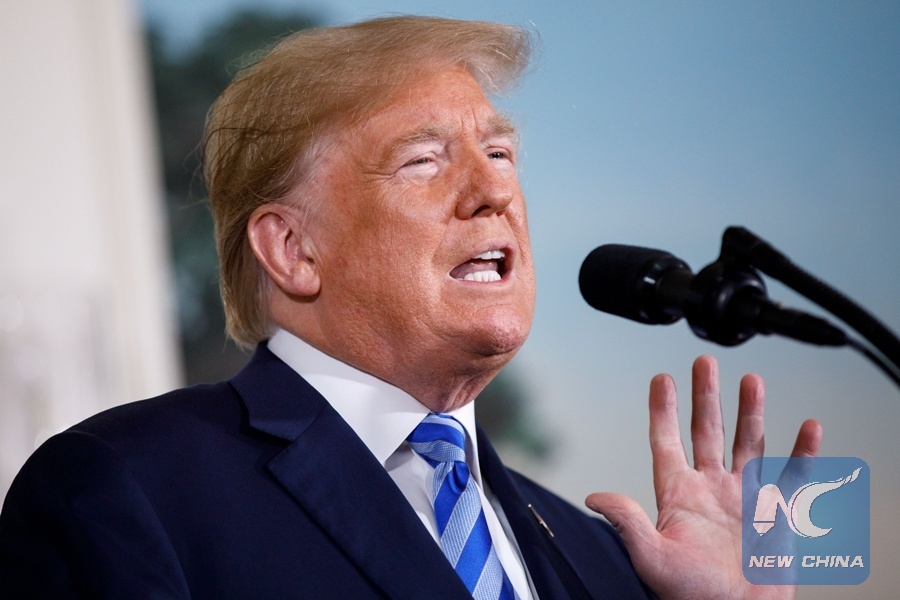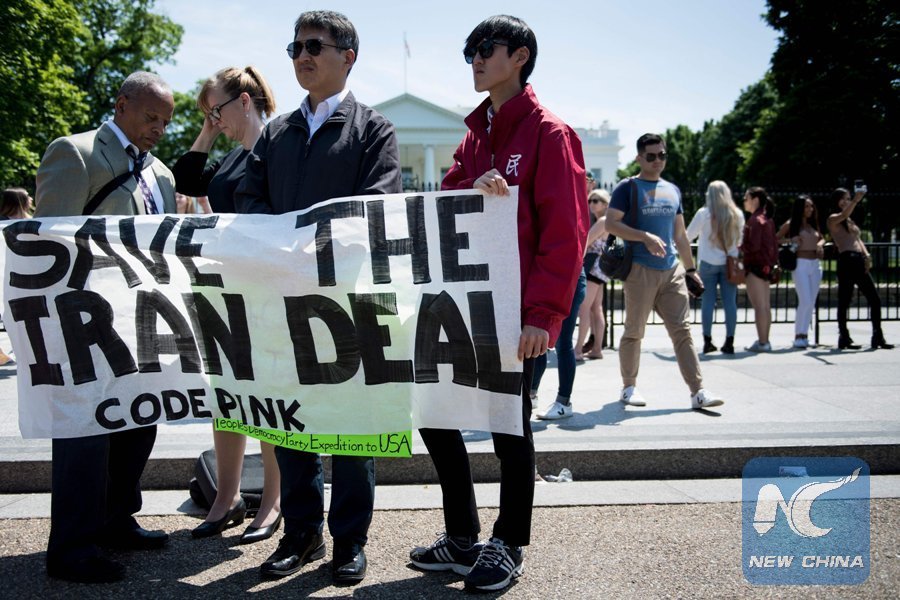
U.S. President Donald Trump delivers a speech at the White House in Washington D.C., the United States, on May 8, 2018. (Xinhua/Ting Shen)
WASHINGTON, May 8 (Xinhua) -- U.S. President Donald Trump's decision on Tuesday to withdraw his country from the Iran nuclear deal would undermine peace and denuclearization prospects, U.S. experts said.
The move to scrap the 2015 landmark international deal aimed at containing Iran's nuclear ambitions would escalate regional tensions by sparking a nuclear arms race, they warned.
WHAT'S BEHIND TRUMP'S DECISION?
Richard Baffa, a senior international and defense policy researcher at the RAND Corporation, told Xinhua that the U.S. withdrawal from the Joint Comprehensive Plan of Action (JCPOA) was "very much expected."
The decision was largely motivated by Trump's personal serious opposition to the agreement as far back as in the presidential campaign, and the encouragement of his new national security team led by John Bolton and Mike Pompeo, Baffa said.
Their opposition is centered on both problems with the agreement itself as well as Iran's regional influence, he noted.
Specifically for the agreement clauses, he said that "the problematic provisions include the sunset provisions (the restrictions expire in roughly a decade); the lack of attention to Tehran's ballistic missile program; continued authorization for limited enrichment; and an inspection regime that may not be able to gain access to military sites."
The expert noted that the recent revelations by Israel on the extent of Iran's clandestine program prior to 2003 "have exacerbated these concerns."
However, in the eyes of Brookings Institution senior fellow Darrell West, "Trump is intent on turning back all the decisions made during the Obama Administration."
"The Iran deal is just the latest example," he said. "Trump believes he can negotiate a better deal than Obama, but he doesn't understand that many other countries were involved and there are complex interests at play."
"The ability to reopen negotiations is likely to be quite limited and the United States will have little leverage without the support of European allies, China, and Russia. It took all of those parties to reach the original deal," he added.
Chris Galdieri, assistant professor at Saint Anselm College in the U.S. state of New Hampshire, told Xinhua that Trump "is largely motivated with undoing as much of Obama's presidency as he can manage."
"Adding to that is the fact that Trump is now surrounded by hawks like John Bolton, and this is not at all a surprise to me," he said in an interview.
HOW WILL TRUMP'S DECISION AFFECT OTHER NATIONS, REGIONS?
The move has been conjectured for months, despite last-ditch efforts by European leaders and supporters to salvage the July 2015 agreement between Iran and the six world powers of Britain, China, France, Germany, Russia and the United States.
RAND's Baffa told Xinhua that the Iran nuke deal was "high on the agenda" of French President Emmanuel Macron, German Chancellor Angela Merkel and British Foreign Secretary Boris Johnson in their visits to the United States recently.
He noted that the issue of secondary sanctions, which Trump warned in his speech, "has the potential to increase tensions" along the two sides of the Atlantic.
As for the Middle East, Baffa said "an Iranian departure from the deal along with a move to re-start its nuclear program," sparked by Trump's decision, "would have profound, destabilizing implications for the region."
"In the near term, the Israelis will be alarmed and the military option almost certainly will be back on the table. Over the mid-term, the Saudis and others might pursue a weapon of their own," he said.
More worrisome prospects are waiting ahead.
Dan Mahaffee, senior vice president and director of policy at the Center for the Study of Congress and the Presidency, said that "with Sunni Arab allies and Israel, the United States is moving towards a policy of more direct confrontation with Iran, rather than the rapprochement under the Obama administration - which Trump and many of his hawkish allies believe was naive."
Brookings' West also noted that the risk is that Trump's decision will spark an arms race in the Middle East.
"Iran may restart its nuclear program and that could propel Saudi Arabia to develop its own nuclear program. The region is likely to become more volatile and chaotic as a result of the deal nullification," he said.
Galdieri told Xinhua that Trump's decision will undercut the U.S. relations with the Middle East, as well as with its European allies.
"I think it hurts them, simply because Trump has now declared that the U.S. can't be trusted," he said.

Protesters stand outside the White House as US President Donald Trump announces the United State's withdrawal from the Irannuclear deal May 8, 2018 in Washington, DC. / (Xinhua/AFP PHOTO)
WHAT COULD BE THE FATE OF JCPOA
Mahaffee said that the future of the deal depends on "how the United States intends to re-implement sanctions."
"If it is a wide ranging set of sanctions that affect any transaction with Iran, the reach of the U.S. financial system will make it hard for European and Asian nations and multinationals to continue their trade with Iran," he said.
However, despite threats to withdraw from the deal, Tehran is unlikely to immediately leave and "even less likely to jump start its nuclear weapons program," Baffa said.
"This course of action would reinforce international concerns about Iran's mid-to-long-term intentions to become a nuclear-armed state and almost certainly lead to a re-imposition of draconian sanctions, he said. "Tehran may make a statement that it is no longer bound by the JCPOA, but note that it is voluntarily continuing to comply with its provisions."
He warned that "if draconian sanctions are eventually re-imposed and if European governments do not successfully push back against such measures, it is possible Iran would then move to formally withdraw from the agreement and re-start its nuclear program."
"A broader collapse of the agreement along with the imposition of harsh sanctions in the coming months, however, could sharply escalate tensions with Iran," he said.
"Freed from the constraints of the JCPOA, Tehran may eventually opt to jump start its nuclear project, a move that would increase the risk of a major regional war," he added.
In an announcement, the Washington-based Arms Control Association denounced Trump's decision, saying it "is an irresponsible act of foreign policy malpractice" that violates the JCPOA.
"European-U.S. efforts to negotiate a supplemental agreement intended to address Trump's complaints failed to yield results because Trump stubbornly refused to guarantee that he would uphold U.S. commitments under the JCPOA," said Daryl G. Kimball, executive director of the independent group.
"Through his reckless actions, Trump is precipitating a proliferation crisis rather than working with our allies to develop a long-term diplomatic strategy to build on the agreement in the years ahead," he noted. (Matthew Rusling from Washington contributed to the story.)

